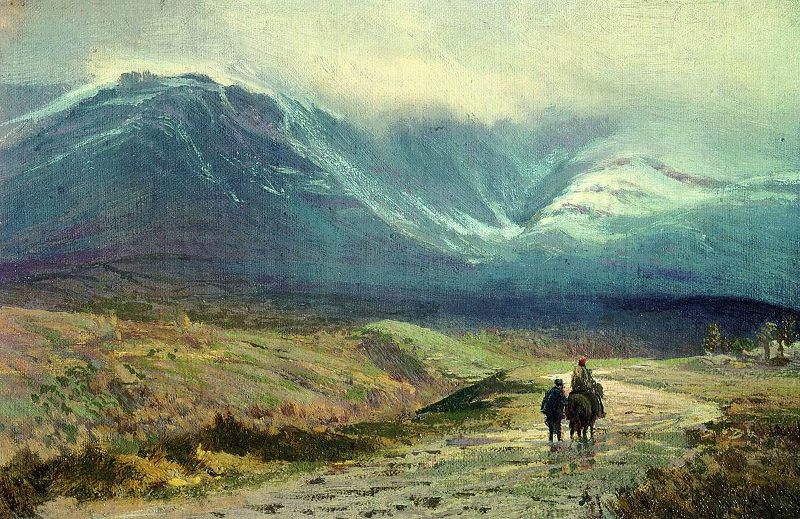David Capps – Five Poems
Some remarks on the poetry of rain
I
The rain’s falling is poetic if only because it emphasizes
the spaces between things.
Listening to the rain helps one learn to see.
II
Imagining the rain, imagining listening to the rain,
do not really differ. One never hears a first drop fall,
one always notices that it has begun to rain.
III
Raining is like the waters breathing,
in shining droplets
the waters seeing.
IV
Rain trickles down, solitary conversants
in an unknown language, while from time to time
a bemused ethnographer looks up:
How would I know before my thoughts are expressed
in this language, that they do not first occur
in the language of the rain?
V
Dogen said: Decheng guiding his disciple is his disciple.
Perhaps the rain guiding my language
is my language.
A Prayer
The moon outside my bedroom window,
same moon by whose light a child holds
his hands together and whispers, moon
shining above the desert waste, where
snakes wait curled in rock crevices,
same moon that unites different worlds,
a candle that clears away the darkness
and allows us to see spirit undestroyed,
and body lifted as into your blue cradle.
Remind us once again of the importance
of sadness.
Myth
One grain of sand was milled to perfection, so that it was a perfect sphere when it fell with others in the hourglass, and the hourglass fell outside time.
Yet upon waking you rub the sleep from your eyes,
calmly you rub the sleep from your eyes.
Field Mice Speak Of
Stars as emptied out of a vase
in patterns of tough equations.
Small questions arise about
drinking flower-heads: who
put them there and why? Some
of the light, as if fallen into
a hex, bends with the squint
of an eye. What shall we name
her, this mouthless glass-blower
who stands by the banks
of overpowering wheatgrass?
Colossi
Chemiburnt and tundried excrescence through hall blakoncrete hyperwalls gearing staged neon glass loudspeaks initial III companichols screenoil rean threadbare multiwoodbetween filaments conferencing satisfaction drilling probing blind teleprompters metallic noise soldering public architectural works squandering corrosive bolts of greasebank blue hooked in march of blank facesconveyors of black shoes
until a storm breaks open arc welders thunder lift their masks a window verdanterre as childhood
peasantly logjam day’s aloed aherd whence golden colonies encircle sinless sun yellow hinds in wickened air wheat colored drapery of ice and honey—
Switches behind, we clamored towards white rocks
bodies shining
chisel
donkeys scraped
hawed on the cliff,
chewing sage and thyme
all birds of the sea rose to meet us
on bank of salt and beak
we whirl-pooled
to the bubbling corpus
of the mountain that had starved
its dry grit unchanged by wind
where Colossi
like tusks jutted out from its navel
mythically as wings of monarchs
resolving into stars.
Author’s Statement on Beauty
When I think about what beauty is I find myself returning to the question of whether a process is beautiful because each of the various stages that make it up is beautiful (or perhaps some sufficient number of them), or are the various stages beautiful because they contribute to a beautiful process.
Each moment of a given sunset (which I enjoy sometimes from the Stop and Shop parking lot) absorbs my conscious awareness, as does each note of one of the many interweaving melodies in a Bach Partita. Perhaps when it’s the stage of the process, or a particular object, that we take to be fundamentally beautiful, then momentarily we forget ourselves and the differences between us and the object, empirical or transcendent, that seem so transparent after the experience of beauty.
Someone who doesn’t appreciate beauty doesn’t have this sort of experience; he might think: if you’ve seen one sunset, you’ve seen them all. But it might be closer to the truth to say that if you’ve seen one sunset, then you haven’t seen any, since at each stage of the process you’ve lost an awareness of yourself.
Yet at the same time, if these stages of the process were not in some way repeatable and it was impossible for us to have some sense of the overall process, if a given life that is beautiful could not be understood to be anything beyond its discrete stages, if the Mona Lisa’s smile lifted off her face one day never to be seen again…

David Capps is a philosophy professor at Quinnipiac University and recent MFA alum of Southern Connecticut State University. His work has been featured in Long River Review, Unlost, and All the Sins. He lives in New Haven with a fluffy Maine coon named Purrbasket.

